Uni SRC condemns AUJS
THE University of Sydney's Student Representative Council (SRC) has responded to the Australasian Union of Jewish Students' (AUJS) complaint about student magazine Honi Soit glorifying a terrorist on its cover – by condemning AUJS.
THE University of Sydney’s Student Representative Council (SRC) has responded to the Australasian Union of Jewish Students’ (AUJS) complaint about student magazine Honi Soit glorifying a terrorist on its cover – by condemning AUJS.
In a motion that passed 11-10 last week, the SRC called the image of suicide bomber Hamida al-Taher “highly defensible”, labelled AUJS’s complaint an “attack on free speech” and stated “defenders of recent Israeli massacres should be confronted about their bigoted views”.
Additionally, a report from the SRC Women’s Officer said Israel “is an apartheid, genocidal, settler colonial regime” and it was the stance of the Wom*n’s Collective, who produced the Honi Soit edition, to oppose its existence.
Falsely accusing Israel of massacres – considered a blood libel –and opposing its existence both run foul of the International Holocaust Remembrance Alliance’s (IHRA) working definition of anti-Semitism, which the SRC endorsed in April this year.
Writing for The AJN, AUJS political director Noa Bloch and AUJS USYD president Ben Ezzes said the suggestion that mere criticism by AUJS is a suppression of free speech “sets a worrying precedent”.
“Elected representatives at the university are utilising bullying, intimidation and scare tactics to silence opposition and disseminate a distorted view of the Israel–Palestine conflict,” they said.
Executive Council of Australian Jewry co-CEO Peter Wertheim said “glorifying terrorism with positive portrayals of violent symbols … is despicable”. He added the SRC’s resolution “has no moral standing whatsoever”.
“The resolution ‘congratulates’ those who published the usual vacuous slogans against Israel which do not stand up to analysis, and statements which expressly denied Israel’s right to exist. These statements fell squarely within the IHRA working definition of anti-Semitism. It’s the height of hypocrisy,” he said.
Meanwhile, at Macquarie University, an email chain circulated last month encouraging academics to boycott a talk by Israeli cyber security expert Avi Shavit.
Institute of Public Affairs research fellow Matthew Lesh, a former AUJS political director, called it “a revolting case of judging someone on the basis of their nationality and religion and not their ideas”.
One boycotter, Dr Noah Bassil, is responsible for deciding what research projects get funded and which PhD students are accepted.
“If he cannot stay above the fray he should recuse himself from decision-making,” Lesh said.
GARETH NARUNSKY


comments